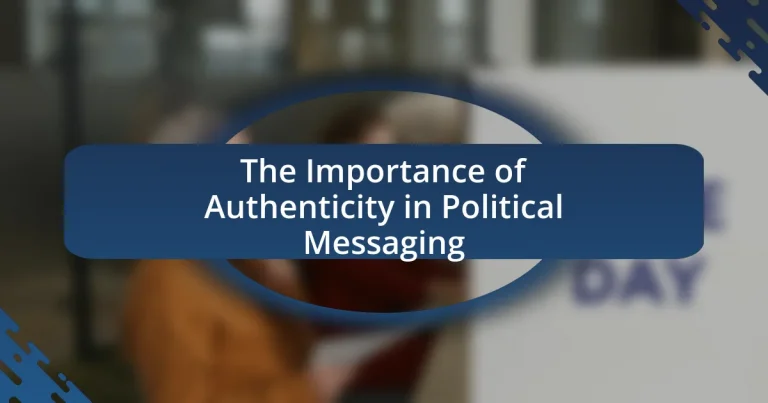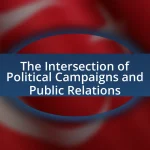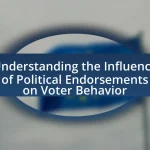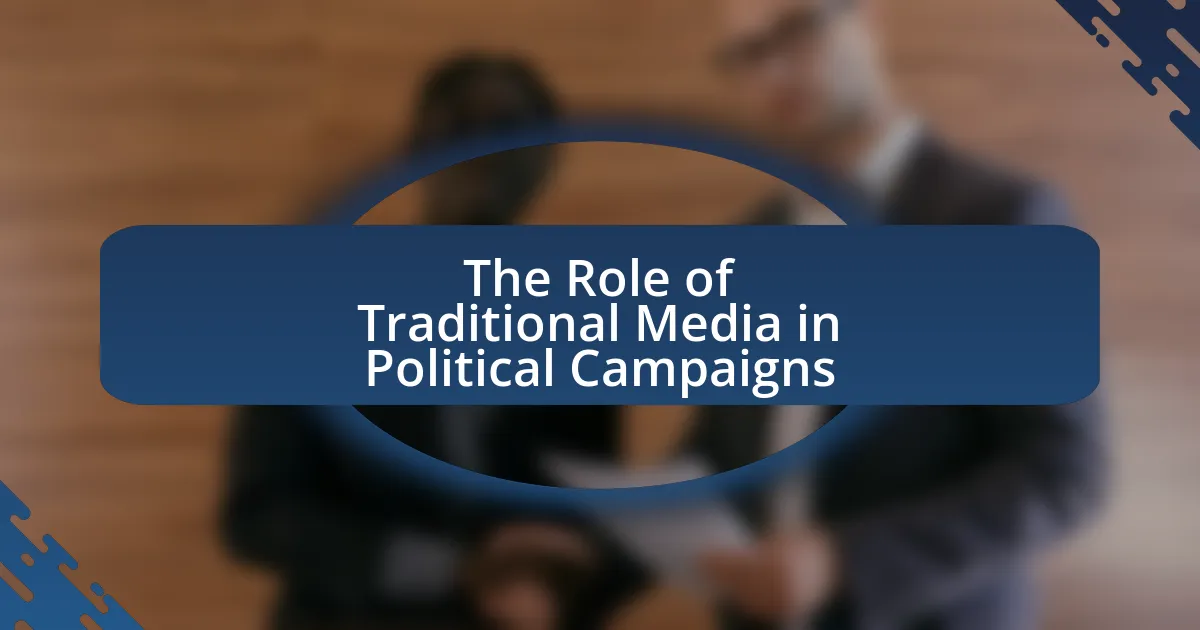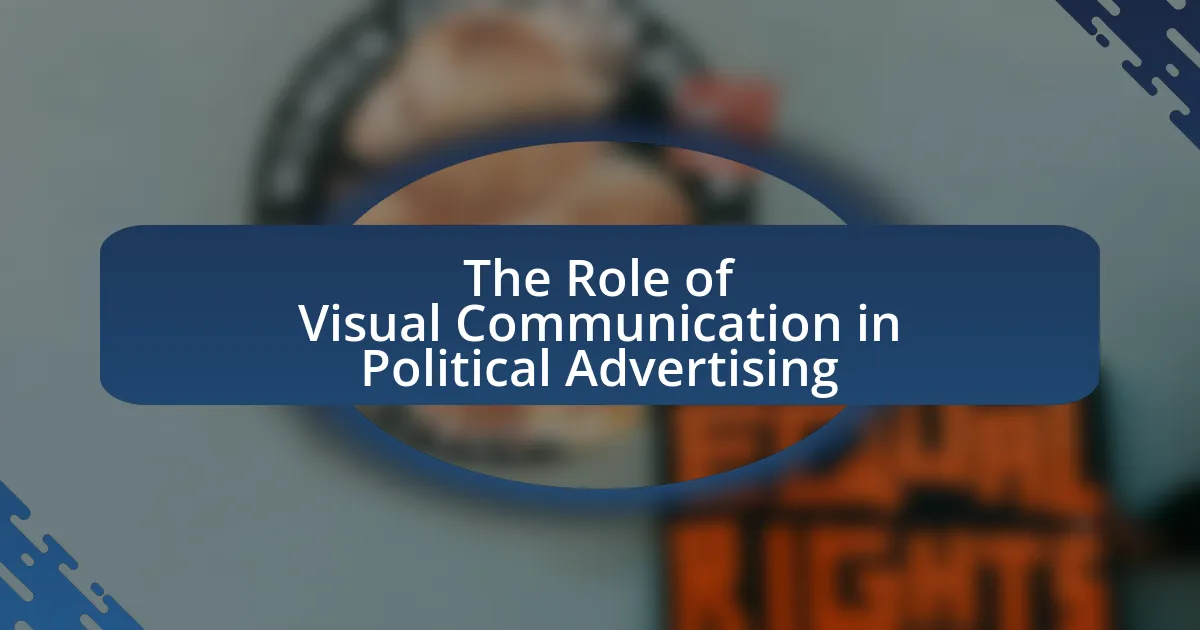Authenticity in political messaging is essential for building trust and credibility between politicians and their constituents. Research shows that 70% of voters prioritize honesty in candidates, indicating that genuine communication fosters deeper engagement and support. The article explores the characteristics of authentic political messaging, the impact of inauthenticity on public trust, and strategies for candidates to enhance their authenticity through transparency, storytelling, and direct engagement with constituents. It highlights the importance of authenticity in influencing voter perception and electoral outcomes, ultimately emphasizing its role in strengthening democratic processes.
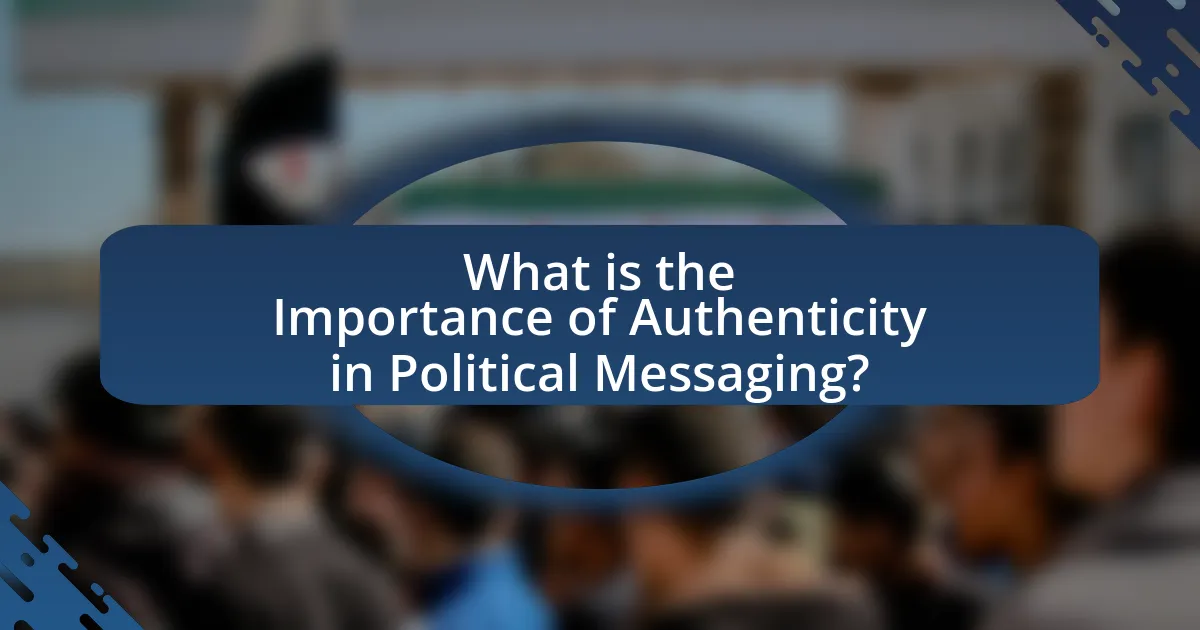
What is the Importance of Authenticity in Political Messaging?
Authenticity in political messaging is crucial because it fosters trust and credibility between politicians and their constituents. When political messages are perceived as genuine, they resonate more deeply with the audience, leading to increased engagement and support. Research indicates that voters are more likely to support candidates who they believe are authentic; for instance, a study by the Pew Research Center found that 70% of voters prioritize honesty in political candidates. This connection between authenticity and voter trust underscores the importance of delivering messages that reflect true values and beliefs, ultimately influencing electoral outcomes.
Why is authenticity crucial in political communication?
Authenticity is crucial in political communication because it fosters trust between politicians and the electorate. When political figures communicate authentically, they are perceived as genuine and relatable, which enhances their credibility. Research indicates that voters are more likely to support candidates who they believe are honest and transparent; for instance, a study by the Pew Research Center found that 70% of voters prioritize honesty in political leaders. This trust is essential for effective engagement and mobilization of support, as it encourages open dialogue and strengthens democratic processes.
How does authenticity influence voter perception?
Authenticity significantly influences voter perception by fostering trust and relatability between candidates and their constituents. When voters perceive a candidate as genuine, they are more likely to believe in their intentions and policies, leading to increased support. Research conducted by the Pew Research Center indicates that 70% of voters prioritize honesty and authenticity in political candidates, suggesting that these traits are crucial for electoral success. Furthermore, candidates who communicate their personal stories and values effectively can create emotional connections with voters, enhancing their overall appeal and likelihood of gaining votes.
What role does trust play in political messaging?
Trust is fundamental in political messaging as it influences voter perception and engagement. When political messages are perceived as trustworthy, they are more likely to resonate with the audience, leading to increased support and mobilization. Research indicates that candidates who are viewed as honest and credible can significantly enhance their chances of electoral success. For example, a study by the Pew Research Center found that 70% of voters consider a candidate’s honesty as a critical factor in their decision-making process. This demonstrates that trust not only shapes individual opinions but also impacts broader electoral outcomes.
How does authenticity differentiate political candidates?
Authenticity differentiates political candidates by establishing trust and relatability with voters. Candidates who present themselves genuinely are more likely to resonate with the electorate, as studies show that authenticity correlates with perceived integrity and reliability. For instance, a 2018 study published in the Journal of Political Marketing found that voters are more inclined to support candidates they perceive as authentic, leading to higher approval ratings and increased voter turnout. This connection is crucial in a political landscape where skepticism towards politicians is prevalent, making authenticity a key factor in electoral success.
What are the characteristics of authentic political messaging?
Authentic political messaging is characterized by transparency, consistency, and relatability. Transparency involves clear communication of intentions and policies, allowing voters to understand the motivations behind decisions. Consistency refers to the alignment of messages with actions and values over time, which builds trust among constituents. Relatability means that the messaging resonates with the experiences and concerns of the audience, making it more engaging and credible. These characteristics are essential as they foster trust and connection between political figures and the electorate, ultimately influencing voter behavior and engagement.
How can candidates demonstrate authenticity in their campaigns?
Candidates can demonstrate authenticity in their campaigns by sharing personal stories and experiences that resonate with voters. This approach allows candidates to connect on a human level, fostering trust and relatability. For instance, research by the Pew Research Center indicates that voters are more likely to support candidates who share genuine personal narratives, as these stories create a sense of transparency and honesty. Additionally, candidates can engage in open dialogues with constituents, addressing their concerns directly and showing vulnerability, which further enhances their perceived authenticity.
What are the consequences of inauthentic political messaging?
Inauthentic political messaging leads to a significant erosion of public trust in political institutions and figures. When politicians communicate messages that are perceived as insincere or misleading, it can result in voter apathy, decreased civic engagement, and a general disillusionment with the political process. Research indicates that 70% of voters express skepticism towards political messages that lack authenticity, which can diminish electoral participation and undermine democratic processes. Furthermore, inauthentic messaging can polarize public opinion, as individuals may gravitate towards more extreme viewpoints when they feel disconnected from mainstream political discourse. This polarization can create a fragmented society, making it challenging to achieve consensus on critical issues.
How does inauthenticity affect public trust in politicians?
Inauthenticity significantly undermines public trust in politicians. When politicians are perceived as inauthentic, it leads to skepticism about their motives and integrity, resulting in decreased voter confidence. Research indicates that 70% of voters prioritize authenticity in political candidates, suggesting that perceived inauthenticity can directly correlate with lower approval ratings and electoral support. For instance, a study by the Pew Research Center found that 63% of Americans believe that politicians often say what they think people want to hear rather than what they truly believe, which erodes trust and engagement in the political process.
What are the long-term impacts of inauthentic messaging on political engagement?
Inauthentic messaging significantly undermines long-term political engagement by eroding trust between constituents and political entities. When voters perceive messages as disingenuous, they are less likely to participate in the political process, leading to decreased voter turnout and civic involvement. Research indicates that trust in political institutions is crucial for engagement; for instance, a study by the Pew Research Center found that only 20% of Americans trust the government to do what is right most of the time, a decline attributed to perceived inauthenticity in political communication. This erosion of trust can create a cycle of disengagement, where individuals feel alienated from the political system, further diminishing their likelihood of participating in future elections or civic activities.
How can political messaging be made more authentic?
Political messaging can be made more authentic by prioritizing transparency and genuine engagement with constituents. This involves openly sharing information about policies, decision-making processes, and the motivations behind political actions. Research indicates that voters respond positively to politicians who demonstrate vulnerability and honesty, as seen in a study by the Pew Research Center, which found that 70% of Americans value transparency in political communication. Additionally, utilizing storytelling that reflects real experiences and concerns of the electorate fosters a deeper connection, making the messaging resonate more effectively.
What strategies can enhance authenticity in political campaigns?
To enhance authenticity in political campaigns, candidates should prioritize transparency, engage in genuine communication, and demonstrate consistent values. Transparency involves openly sharing information about policies, funding sources, and decision-making processes, which builds trust with voters. Genuine communication can be achieved through personal storytelling and relatable messaging that resonates with constituents, making candidates appear more approachable and sincere. Consistent values ensure that candidates remain true to their principles, which reinforces their credibility and fosters a sense of reliability among voters. Research indicates that voters are more likely to support candidates who exhibit these traits, as authenticity is a key factor in electoral success.
How can storytelling be used to convey authenticity?
Storytelling can be used to convey authenticity by creating relatable narratives that resonate with audiences on an emotional level. When political figures share personal stories or experiences, they humanize themselves, making their messages more credible and trustworthy. Research indicates that narratives can enhance memory retention and engagement; for instance, a study published in the journal “Psychological Science” found that stories are more effective than facts alone in influencing attitudes and beliefs. This demonstrates that storytelling not only captures attention but also fosters a sense of connection, reinforcing the authenticity of the message being conveyed.
What role does social media play in promoting authentic messaging?
Social media plays a crucial role in promoting authentic messaging by providing a platform for direct communication between individuals and organizations, allowing for real-time engagement and feedback. This immediacy fosters transparency and accountability, as users can share their experiences and opinions, which encourages political figures and organizations to present genuine narratives. Research indicates that 70% of consumers are more likely to trust brands that engage authentically on social media, highlighting the importance of authenticity in building trust and credibility.
What best practices should politicians follow for authentic messaging?
Politicians should prioritize transparency, consistency, and relatability in their messaging to achieve authenticity. Transparency involves openly sharing information about policies and decisions, which builds trust with constituents. Consistency in messaging reinforces credibility, as it demonstrates that politicians stand by their values and commitments over time. Relatability allows politicians to connect with their audience on a personal level, making their messages more impactful. For instance, a study by the Pew Research Center found that 70% of voters value honesty and transparency in political leaders, highlighting the importance of these practices for authentic communication.
How can feedback from constituents improve authenticity?
Feedback from constituents can improve authenticity by providing direct insights into their needs and perceptions, allowing political representatives to align their messaging with the actual concerns of the community. When constituents express their opinions, it enables politicians to adjust their communication strategies, ensuring that they resonate with the electorate’s values and experiences. For instance, studies have shown that politicians who actively engage with constituent feedback are perceived as more trustworthy and relatable, which enhances their authenticity. This alignment between messaging and constituent expectations fosters a genuine connection, reinforcing the importance of authenticity in political messaging.
What are common pitfalls to avoid in political messaging?
Common pitfalls to avoid in political messaging include lack of authenticity, overgeneralization, and failure to understand the audience. Lack of authenticity can lead to distrust; for example, politicians who present insincere messages often face backlash, as seen in various election cycles where candidates who appeared disingenuous lost voter support. Overgeneralization can dilute the message, making it less relatable; specific, targeted messaging tends to resonate more effectively with constituents. Additionally, failing to understand the audience can result in misaligned messaging, as evidenced by campaigns that did not consider demographic preferences and cultural contexts, leading to ineffective outreach.
How can authenticity in political messaging lead to better voter engagement?
Authenticity in political messaging can lead to better voter engagement by fostering trust and relatability between candidates and constituents. When political messages are perceived as genuine, voters are more likely to feel a connection to the candidate, which can increase their willingness to participate in the electoral process. Research from the Pew Research Center indicates that 70% of voters prioritize honesty in political candidates, suggesting that authenticity directly influences voter perceptions and behaviors. Furthermore, authentic messaging often resonates more deeply with voters’ values and experiences, leading to higher levels of engagement, as evidenced by increased turnout rates in elections where candidates are viewed as authentic.
